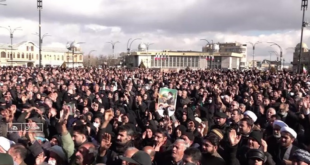The most noteworthy aspect of Hezbollah’s general-secretary’s last speech was the shift from denial to affirmation.
Denial reflected an image of the party as one that is fighting for justice and truth, a battle that disregards the balance of power in its path to fulfill its “honest promise”.
This allowed the party to speak in the name of the Lebanese people and threaten its enemies, whom it would frame as the enemies of the Lebanese. It also allowed it to attract countless remains of parties, ideologies, and defeated dreams which count on the party to bring them back from oblivion.
Affirmation refers to admitting to the Lebanese, though with circumlocution, that the party is subject to certain balances of power and that there are things it can and cannot do. This affirmation, by extension, confirms the following: The balance of power has shifted slightly against it after the US sanctions hit the party and Iran and Lebanon as well because of it. It also shifted because the economic difficulties facing Hassan Diab’s government became clear. In addition, the revolution showed that the overwhelming majority of the Lebanese do not favor the same choices as those of Hezbollah.
Even before their position was recently weakened, there had been many instances throughout the party’s history in which it demonstrated that it succumbs to the balance of power: From the “April Understanding” in 1996 to the Security Council Resolution 1701 after the 2006 war, and in between, “the understanding” with those who had been denounced as “agents of America and Israel” by the media of the axis of resistance. This “understanding” with the Aounists was reached to break the political blockade of Hezbollah that had sprung up after the assassination of Rafik Hariri.
This “understanding” did not cheat anyone: its sixth clause states: “Based on both sides’ conviction that the presence of Lebanese citizens in their homeland is better than their presence on enemy territory, the resolution of the question of the Lebanese residing in Israel requires swift action to ensure their return to their country, taking all the political, security and livelihood circumstances surrounding the matter into consideration. Thus we call on them to promptly return to their country in compliance with the call issued by Sayyed Hassan Nasrallah following the Israeli withdrawal from south Lebanon and the speech delivered by General Michel Aoun in the first parliamentary session.”
Retired Brigadier General Fayez Karam was one of the beneficiaries of this clause. It was agreed that sentences for collusion with the enemy would be suspended.
Of course, contrary to what was claimed in the speech, Hassan Nasrallah knew that Amer Fakhoury would be smuggled out. However, Hezbollah cannot bear making that kind of affirmation, for it would not just contradict its narrative about itself and its cause; it would shock its followers who grew up on this narrative, on denial. Nasrallah, though, cannot name any political faction that facilitated Fakhoury’s escape, since losing allies who make his missions in Syria and abroad easier would shift the balance of power further against the party.
What is happening cannot be unlinked from Iran’s simultaneous release of Michel White over “humanitarian and health reasons.” White is a US citizen who had been detained since 2018. Iran also asked for an emergency loan of 5 billion dollars from the International Monetary Fund and has perhaps reached new understandings with the Americans concerning Iraq.
In other words, Hezbollah acted in “Lebanized” fashion. Its secretary-general, aware of the balance of power in the country and the region, almost repeated the phrase of the Kataeb Party founder Pierre Gemayel: Lebanon’s strength is in its weakness.
Naturally, it was a painful blow that Nasrallah could not evade. This is why we saw him directing his speech at friends rather than enemies whom he normally threatens. Instead of the customary screaming, he seemed noticeably dejected by the “kin” and those who are kept close, a dejection that was accompanied by two firm warnings: We do not allow you to call us traitors nor do we allow you to insult us.
He addressed his friends as political leaders and pragmatists address their purist ideological comrades whose tongues precede their minds, while their responsibility is limited to declaring a rhetorical position. He addressed them to explain what they had not been aware of, what cannot be spoken of publicly to them or others.
If we put various intentions and personal calculations aside, it seemed that these friends had not known much: They are ignorant of the balance of power in the country and the region and don’t know that the times are changing, that we are not in the era of Gamal Abdel Nasser, the Palestinian resistance or the Socialist camp. Most critically, they are unaware that Hezbollah, which does not exist to serve their ends, does not present itself with any of the apocalyptic liberation scenarios that failed at the time, and have kept on failing since.
So, neither their reality nor their notion of time are real; Hezbollah itself is not what they imagine it to be. Given all of this, Nasrallah might have repeated to himself the old aphorism: With friends like mine, who needs enemies.
 Eurasia Press & News
Eurasia Press & News



